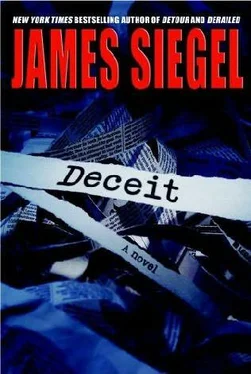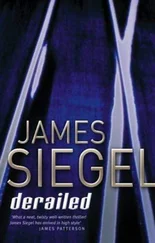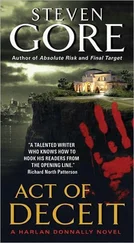My brother Jimmy slipped on the ice and he hit his head.
He is always falling down and stuff like that.
He is really clumsy.
No.
In my dream, my father returns to save us. He comes back to his family.
I hear him shuffling up our front stoop.
Sloshing through the wet snow.
Banging on the front door.
He’s going to walk in and shake the snow off his slicker, and run to Jimmy and make him wake up.
The door opens.
Dad , I say. Dad.
But he can’t speak. The frigid cold, the swirling snow. He can’t speak.
He motions me to come closer.
I run to him in my Batman PJs, but they’ve somehow changed color. They’re drab and gray.
And my dad. Something’s wrong with him. He can’t speak. He’s talking but nothing’s coming out of his mouth.
He grabs me by my PJs and pulls me out into the snow.
But there is no snow.
Just an empty hall tinged in red.
Shhh…
He can’t speak, but he’s still able to whisper.
Dennis motions for me to follow him.
There’s a key glinting in his hand.
Maybe I should’ve asked myself how he got it.
The key.
You could drive yourself crazy with that stuff.
If you were the night garage attendant at VA Hospital 138, this is what you would’ve seen: a sleepy-looking orderly making his way across the deserted parking garage.
“Long day?” you would’ve asked him.
The orderly would’ve nodded and said, “Yeah.” Then he would’ve searched through his pockets, looking suddenly surprised and irritated.
“Jesus,” he would’ve said, after turning both pockets inside out. “I lost my parking ticket. It was right here this morning.”
You would’ve nodded in sympathy.
After all, the poor guy looked half out of it. If the truth be told, he stank a little-as if he’d been running a marathon. As if he’d spent all day wrestling unruly patients into submission.
As if he’d plucked his stinking blue work shirt out of the dirty pile in the hospital laundry room.
“What kind of car?” you would’ve finally asked him, taking pity and kind of eager to get his fetid presence out of your immediate breathing space.
“A Miata,” the orderly would’ve answered. “Silver-blue and kind of beat up.”
“Okay,” you would’ve said. “I’ll go find it.”
“You sure?” the orderly would’ve asked, not wanting to get you into any trouble. “I really appreciate it.”
“No problem,” you would’ve answered him, already walking out of your glass booth with a handful of numbered keys, on your way to the lower level, where, if memory served you correctly, you’d seen the silver-blue Miata with a lopsided bumper.
Sure enough, that’s where you’d find it. Then you’d check the ticket on the dashboard, fit the right key into the door, and drive right up to the very grateful orderly who looked like he could really use a good night’s sleep.
You’d watch as the orderly settled into his front seat and drove away. You’d think that car and driver suited each other. That even though neither was particularly ancient, they’d accrued a lot of mileage.
It was just a matter of time before they both broke down.
I followed the same roads i’d followed before.
I was okay for gas. I had mad money-a credit card stored in my glove compartment just in case. My cell phone was in the cup holder where I’d left it. There was no need to turn it off and make it invisible to prying satellite signals. It was out of power.
The surroundings were familiar.
The thickening forests and creeping cold.
I was headed somewhere I’d been.
Back to six log cabins on the shore of Bluemount Lake.
I knew where the turn-in was this time.
I knew that I had to circle the lake two times like someone playing Duck, Duck, Goose, roundabouting my way to that sign nailed to a tree.
I knew the car would shake, rattle, and roll its way through the woods.
I knew that when the forest spit me out on the edge of Bluemount Lake, there would be no one coming out of that porch to greet me.
I pulled up to the cabin porch and sat there for a minute, as if I might be wrong. As if Wren would open the door and invite me in for some vitriol and secondhand smoke.
Nothing.
I got out and walked up the steps. I pushed the door open and walked inside.
There was no stove going this time, but it was still early afternoon. There was enough sun to take the chill off.
No one had bothered to clean up the clutter. I saw it for what it was now-someone had ransacked the place. Just like they’d ransacked my basement before I’d moved in.
I sat there and went through everything this time.
Everything they must’ve gone through, too. I didn’t really expect to find anything, but it was due diligence. You never knew. Back when I was starting out in journalism, we called it gold mining . Why? Because in your average gold mine, it takes three tons of earth to accrue a single ounce of gold. The particles so small that they’re referred to as invisible gold .
Sometimes you have to sift through a lot of mud to find what’s invisible.
There were some personal letters addressed to Wren.
An ex-flame named Dorothea-she didn’t write her last name; ex-flames don’t need to-reminiscing about steamy times in the Florida Keys.
A Mr. Poonjab from Micronesia-one of Wren’s acquaintances from his days as a foreign stringer, maybe. Mr. Poonjab offered best wishes from his wife and family.
Wren, himself, didn’t seem to have had a family. No letters from wives. No Hallmark birthday cards from the kids. That would’ve made it convenient for them-Wren not having any family. That and his sudden penchant for being alone.
Mr. Poonjab said he’d be forwarding what Wren had requested in the next post.
It was impossible to know what that was.
What would someone want from Micronesia?
Coconuts? Palm fronds? Seashells?
Maybe something more germane. The United States had obliterated that South Seas idyll with nuclear test bombs until the 1960s-an island chain so polluted with radioactivity that it was largely uninhabitable. The United States was currently resettling the population and paying bargain-basement reparations.
Maybe Wren had needed a first-person account from the nuclear moonscape.
There were two medical journals under the couch, one of them a dry and sober treatise on the effects of radioactive fallout.
There were ten copied pages from a book on America’s fledgling nuclear weapons program.
A biography of the Hiroshima Maidens-a group of disfigured nuclear survivors who’d become something of a traveling vaudeville show.
A study on Los Alamos soil samples.
Sure.
He must’ve driven out to Littleton Flats, just like I had. He must’ve scooped up some of that red dirt and sent it away in vials to Dearborne Labs. I think it’s radioactive, he must’ve told them.
I think it’s hot.
He was right.
There were the usual household bills-mostly from Wren’s years in Littleton.
Oil and electric.
Telephone and cable.
A receipt from a roof gutter cleaner.
An estimate for a carpet cleaning.
There was a construction bill signed by Seth Bishop. Sheetrock work.
Five hundred dollars scrawled in Seth’s spidery script.
There were yellowed articles with Wren’s byline, posted from the exotic and mundane.
Thailand. Poland. Newark. Cleveland.
There were doctor bills. Wren appeared to have suffered from mild arrhythmia, high cholesterol, and occasional depression. I found a prescription for Xanax-a drug whose popularity around the newsroom was second only to uppers, since it was known as an anxiety soother. Reporters under murderous deadlines tended to have a lot of anxiety.
Читать дальше












